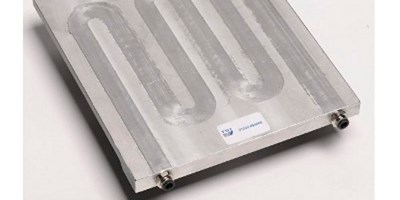Thermal management is a critical area in the development of future transport systems. Heat generation in vehicles is increasing due to the expansion of electronic functionality. In parallel, the demand for more powerful propulsion systems is often limited by the ability to dissipate waste heat without resorting to extra complexity and mass. This is driving demand for new approaches to thermal management. Heat transfer solutions are required to be more efficient, compact and lighter while remaining cost-effective.
Stationary shoulder friction stir channeling is an innovative solid-state process for integrating sub-surface networks in aluminum structures. The feasibility of the process was already demonstrated during two TWI exploratory projects, placing the technology readiness at level 3.
TWI plans to conduct a joint industry project to further mature SSFSW towards TRL 4, i.e. producing and testing realistic prototypes in laboratory conditions. TWI Member companies sponsoring this programme will be able to steer the development of a new manufacturing process towards their immediate requirements and product development.
A project launch meeting will be held at TWI on 17 September 2019 to discuss and refine the content of the project.


